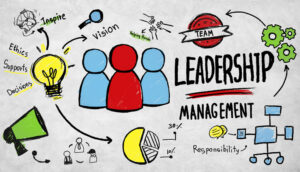Ryan Wang at Assembled outlines how to be a good team leader for an empowered customer support operation.
No matter what your first job was, you probably recall just about every detail — especially what it was like working with your manager.
Your relationship with your manager was probably one of the driving forces (maybe even the driving force) behind your overall attitude about that job. For most customer support professionals, this is still true today.
As a leader, the way you manage your team clearly matters. How can you ensure you’re doing it in a way that leaves employees feeling empowered? It comes down to avoiding some common missteps and doing your best to exemplify some key traits.
Before getting into how to be a good team leader, it’s important to explore why it’s so essential in your workplace.
Why Being an Effective Customer Service Leader Is Critical
For agents, your abilities as a leader directly affect how they feel about their careers.
“Good leadership can make the difference between people hating their jobs and people loving their jobs,” says Talal Naboulsi, who leads the support team here at Assembled.
There’s plenty of research to support the idea that good leadership helps to boost employee morale. A shows that relationships with management are responsible for a whopping 86% of employees’ overall satisfaction with their workplace relationships — this translates to job satisfaction and even life satisfaction.
Further, research from The Predictive Index shows that 94% of employees with great bosses say they’re passionate about their jobs.
Also consider that being an effective customer support leader involves establishing trust, which really makes a difference to employees.
Neuroscientist Paul Zak shared research in the Harvard Business Review revealing that compared to employees who work at organizations where trust is low, those who work for companies where trust is high are:
- 74% less stressed
- 106% more energized at work
- 50% more productive
- 76% more engaged
When individuals perform better, it impacts your entire team.
“A great team with effective support team management really stretches out what is typically conceived of as support to include a whole lot more,” Talal explains. “You go from answering questions to taking care of customers.”
Continually focusing on elevating the customer experience will also help to improve the whole organization.
Customers who receive excellent support are more likely to recommend your company to others and even become repeat buyers.
The benefits to the entire organization become even clearer if you’re able to convey just how essential your team is to company leadership.
A Zendesk report actually found that having a member of the C-suite immersed in customer service is one of the hallmark traits of a winning company.
Common Customer Support Leadership Mistakes to Avoid
Being an effective customer support leader is as much about avoiding managerial missteps as it is about enacting best practices.
While you shouldn’t become overly concerned about making mistakes (you’re only human!), it’s helpful to know about some common ways managers tend to slip up.
To that end, Talal recommends avoiding these mistakes:
- Assuming Others Want to Be Managed the Same Way You Do — everyone has their own preferences. Some may want more guidance while others prefer more autonomy. As a leader, it’s up to you to adjust your style to suit every individual’s needs.
- Failing to Offer Support When Things Get Tough — dismissing your team’s concerns when they’re working with a challenging customer can make them feel abandoned. This doesn’t mean you should solve every issue for them, but you should be a sounding board and help to identify solutions.
- Not Communicating Expectations — if you don’t clearly spell out benchmarks, your team can quickly become confused. This is why it’s essential not only to document expectations, but discuss them regularly.
- Providing Too Little Feedback — when your team doesn’t receive enough guidance or coaching, they won’t have any sense of whether they’re performing well or poorly. Make offering feedback, both positive and constructive, a regular part of your communications with each team member.
These traits align with some additional findings from The Predictive Index report. It shows that employees are frustrated by managers who don’t communicate clearly, don’t show interest in employees’ professional development, and don’t listen.
7 Best Practices for Being an Effective Customer Support Lead, Manager, or Workforce Manager
Now for how to actually be a good team leader. Keep in mind that there’s no perfect model. These suggestions are meant to serve as useful advice that can help every leader in customer support become a bit better.
1. Be a Product Expert
Have you ever called a company’s support department with a straightforward product question that left the agent on the other end buying time as they searched for the right answer? It’s not exactly a great experience.
Knowing the ins and outs of the products and services they represent is an essential customer support agent competency — and it is for you as well.
“Being a product expert is going to be paramount,” Talal says. “You need to be able to stay at a high level for leadership purposes, but you also need to be able to dive deeper and understand the nuances of the product.”
As for how to become knowledgeable about your organization’s products and/or services, make use of all the resources available to you, such as your internal knowledge base.
It’s also hugely beneficial to develop relationships with the people who actually create what it is your company offers. If you work in the SaaS industry, for example, get to know your developers.
2. Become a Great Recruiter
The best customer support teams are ones that have empathetic and inclusive cultures. And they don’t achieve those values by accident — they hire for them.
While it can be easy to focus on filling roles as quickly as possible, exercising patience as you find the proper candidates will ultimately pay off.
“Good people solve about 90% of your problems,” Talal says. “And then the other 10% you figure out with them.”
Focusing on recruiting the right customer support agents also helps to reduce attrition because finding people who are the right fit for your team results in satisfied agents who are less likely to leave.
That’s a huge advantage in the customer support space. A recent market study from CCW Digital shows that 33% of contact centres are struggling with high turnover.
Hiring the right people will solve multiple issues at the same time.
3. Don’t Just Manage, Coach
“Management” is nearly a four-letter word in today’s workplaces. It’s usually seen as directive and focused pretty narrowly on tasks. It only helps employees so much.
But the concept of coaching is gaining a lot of traction in professional environments. What exactly is coaching? As the Society for Human Resource Management (SHRM) explains, coaching involves:
Seeing your team members as capable and resourceful
- Being clear and open
- Exercising good listening skills
- Understanding that coaching isn’t the same as training
- Challenging traditional ways of thinking
These traits and tactics enable you to help your team learn new skills and develop as professionals, which helps you do your job even better.
“You really have to quickly move from being the one who knows everything to the one who can teach and coach because your time is not best spent doing — it’s best spent teaching and focusing on things at a higher level,” Talal adds.
4. Learn How to Navigate Other Departments
It’s no secret that customer support doesn’t receive much attention from other departments. The Zendesk report makes this clear — 40% of business leaders say that customer support isn’t owned by any C-suite executive at their organization.
But successful cross-departmental collaboration can help to showcase your team’s value and ensure they have someone protecting their time.
Being a vocal advocate for your team helps you set guardrails to prevent others from treating customer support as an internal help desk or looking down on them.
“No matter how much a company aims to be direct and flat, as soon as you start getting a little bigger, there’s going to be some form of politics,” Talal says.
He adds that successfully working alongside other departments becomes both more critical and more challenging as you start to take on larger customers.
You’ll need to fine-tune your abilities working with others and taking an active role in conversations with so many stakeholders involved.
5. Be Kind
The golden rule — to treat others the way you wish to be treated — is as relevant as ever for customer support leaders.
There will always be high-pressure situations, difficult customers, etc., but it’s essential to make sure you retain your sense of empathy and compassion through it all.
“Be kind — these are people,” Talal emphasizes.
And it turns out that kindness is infectious. One 2018 study shows that people who are treated kindly at work are more likely to pay it forward to their co-workers — they also tend to be more satisfied with their jobs and their lives as a whole.
Being considerate toward your team members probably comes naturally if you regularly see them in person.
This is slightly trickier in a remote environment. It isn’t always easy to tell how employees are feeling when you don’t have as much face time with them, so go the extra step to ask questions and connect with them on a personal level.
“You really have to actively think about investing in knowing more about them — not always having a Zoom call that is just about work,” Talal explains.
6. Make Use of the Right Technology
The right tools make all the difference in customer support. Maybe you’ve already begun to recognize this as you’ve started to use different platforms that automate tasks you once did manually, such as forecasting.
Having the right technology will only become more important as your team grows and as you climb the leadership ladder.
“I don’t think you can be an effective leader at scale without the right tooling,” Talal notes.
Consider the impact that implementing something like a workforce management solution can have on your team.
“If you free up 50% of your time, then you have 50% more of your time to spend on growing your people and growing the company itself,” Talal explains.
7. Adapt and Grow Your Skills
Don’t feel like you’re the ideal manager? That’s OK! It’s more important that you’re eager to refine your leadership skills and have a desire to improve (we’re all about progress over perfection).
“The best we can do is to take care of our people and our customers, and then just deal with it as it comes,” Talal recommends. “I don’t think there’s a manual for this.”
There are plenty of ways you can work to become even better over time, whether you’re a customer support team lead, a customer support manager, or a workforce manager.
Start by asking your team for feedback. What about your leadership style do they like? Do they want more one-on-one guidance? Are there ways you could communicate with them more effectively?
There are plenty of books and other written resources out there as well, but you’re probably better off seeking an experienced mentor.
The key is to identify a person whom you respect and find out if they’d be willing to share their experiences and advice with you.
You could contact someone who runs a support department at an organization you admire or even reach out to a former manager of yours. For Talal, a previous manager set a great example that he still keeps in mind.
“The best boss I’ve had really did two things — she cared about her people, and that manifests in a ton of different ways, and she cared about the customer,” he says. “I think those are two fundamental things.”
Be the Leader Your Team Deserves
There’s no clear-cut guide on how to be a good team leader. While each of the suggestions above can help, it really takes practice and a willingness to make the occasional mistake. If you do slip up? Own up to it and commit to doing better next time. Your team will appreciate the honesty.
Remember, being a good manager is ultimately about helping your team members be the best they can be. But exercising effective leadership will only take them so far. Don’t forget to provide them with the resources they need to progress in their own careers.
This blog post has been re-published by kind permission of Assembled – View the Original Article
For more information about Assembled - visit the Assembled Website
Call Centre Helper is not responsible for the content of these guest blog posts. The opinions expressed in this article are those of the author, and do not necessarily reflect those of Call Centre Helper.
Author: Assembled
Published On: 24th Apr 2023
Read more about - Guest Blogs, Assembled






 Assembled is a Support Operations platform that helps companies maintain exceptional customer experiences, no matter what lies ahead. Leading brands use Assembled's workforce and vendor management capabilities to make optimal staffing decisions, gain visibility into performance and productivity, and unlock new ways to serve evolving customer needs.
Assembled is a Support Operations platform that helps companies maintain exceptional customer experiences, no matter what lies ahead. Leading brands use Assembled's workforce and vendor management capabilities to make optimal staffing decisions, gain visibility into performance and productivity, and unlock new ways to serve evolving customer needs. 





























